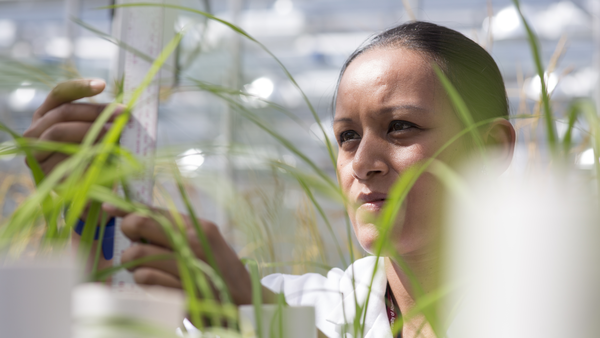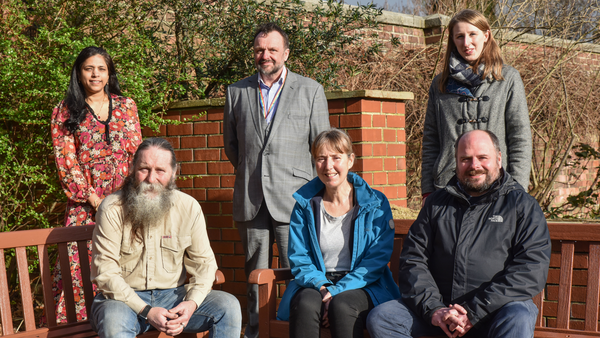
Introduction
With one of the most established soil science centres in Europe, Aberdeen is proud to maintain this MSc programme that teaches characterisation and basic properties of soils, combined with state-of-the-art techniques.
Study Information
At a Glance
- Learning Mode
- On Campus Learning
- Degree Qualification
- MSc
- Duration
- 12 months or 24 months
- Study Mode
- Full Time or Part Time
- Start Month
- September
- Location of Study
- Aberdeen
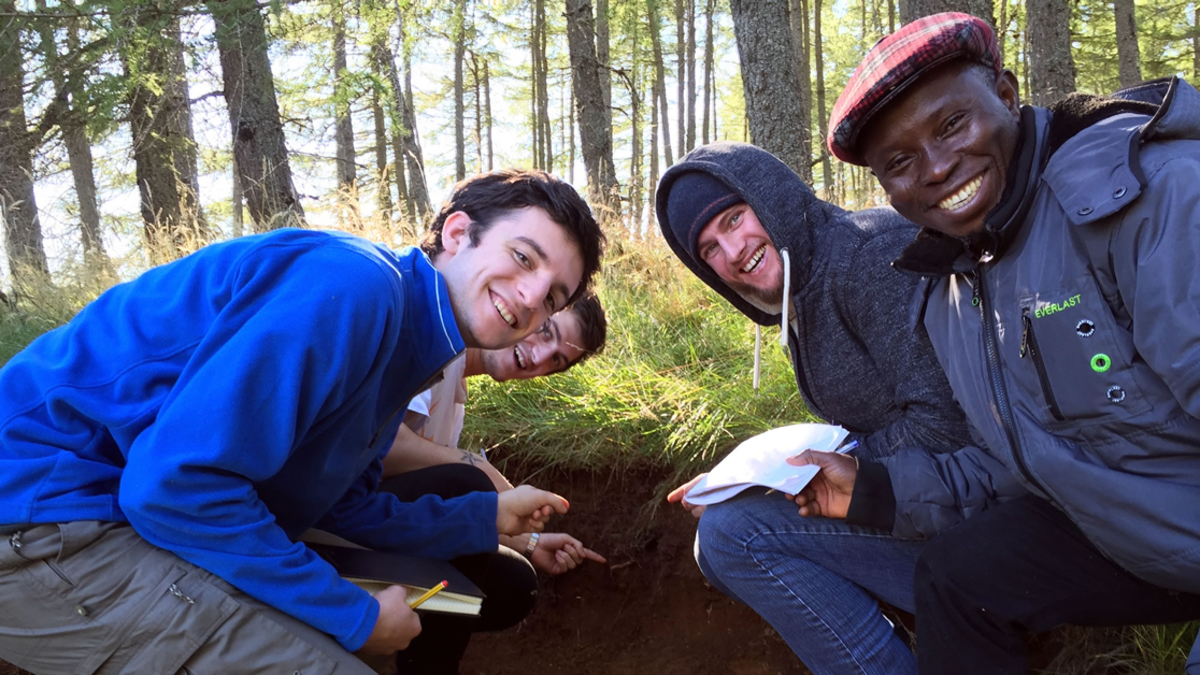
The University of Aberdeen has been producing high quality Soil Science graduates for over 60 years, with world leading researchers, renowned consultants and senior government staff amongst our alumni. You will receive intensive training in soil and environmental sciences, with a large focus on field and laboratory based teaching. Our School maintains expertise in all core areas of soil science (biology, chemistry, physics and pedology), so you can be assured of teaching by experts in the field. The final component of the MSc is a research project, conducted under the supervision of either departmental staff or institutions and agencies with whom we have close links.
The MSc Soil Science aims to provide you with:
- A fundamental understanding of the nature and properties of soils.
- An ability to apply knowledge in academic and real world contexts, such as food security or environmental sustainability.
- Opportunities to learn from world renowned researchers from a range of specific topics in soil science.
The prestigious Queen's Anniversary Prize was granted to the University of Aberdeen for world-leading research and education in Soil Science promoting the control of greenhouse gas emissions and sustainable food production. Our scientists have established a world-leading centre of excellence in Soil Science which strives to find solutions to some of society’s greatest threats including the climate crisis and environmental change.
What You'll Study
- Stage 1
-
Compulsory Courses
Stage 1 compulsory courses include:
- BI5013 - Ecological and Environmental Data Analysis Using R
- EV5319 - Tools for Land Management and Climate Mitigation
- SS5005 - Global Soils and the Environment
- SS5311 - Plants, Soils and Sustainability
- Getting Started at the University of Aberdeen (PD5006)
-
This course, which is prescribed for all taught postgraduate students, is studied entirely online, takes approximately 5-6 hours to complete and can be taken in one sitting, or spread across a number of weeks.
Topics include orientation overview, equality and diversity, health, safety and cyber security and how to make the most of your time at university in relation to careers and employability.
Successful completion of this course will be recorded on your Enhanced Transcript as ‘Achieved’.
- Stage 2
-
Compulsory Courses
Compulsory courses include:
- PL5810 - Ecosystem Processes
- Applications of GIS (EV5517)
-
15 Credit Points
Lectures and structured workshops develop your knowledge of the principles and practice of geographic information systems, and familiarise you with ArcGIS software, enhancing your employability.
An individual investigation allows you to explore a specific application that you are interested in and demonstrate your proficiency with the software and your command of the conceptual underpinnings.
A flexible teaching and learning environment allows for individualised learning and enrichment for students with existing skills in GIS.
- Environmental Analysis (EV5800)
-
15 Credit Points
The mixture of applied science and theoretical work on this course places you in a valuable position for understanding the procedures and applications in modern environmental science.A number of laboratory classes allows you to familiarise yourself with the current analytical instrumentation in environmental science.The course uses examples of environmental issues allowing you to understand the problem, how the analysis was conducted and the implications of the results. The main assessment in this course is a practical write up that is written in the style of a scientific report giving you an opportunity to perfect this style of writing.
- Land Remediation (SS5508)
-
15 Credit Points
This highly interactive course explores the principles and practice of contaminated land assessment and remediation. It provides broad knowledge of underlying science, as well as practical skills related to the assessment of contamination sources, pathways and risks to human health. While the lectures introduce theoretical background and gradually build the expertise, the practical have been based on various assessment tools and develop practical knowledge and quantitative skills. The learning activities replicate tasks that one would encounter in environmental consultancy and provide valuable transferrable skills.
- Stage 3
-
Compulsory Courses
- Project in Soil Science (SS5903)
-
60 Credit Points
The three-month individual Research Project can cover any area of soil science and is undertaken under the supervision of a member of staff who is an expert in your chosen field. Many projects are also done in collaboration with an external organisation. The project provides opportunities for you to develop your abilities and skills, generate hypotheses and design ways of testing them and to analyse, report and discuss your findings. You will learn to take responsibility for implementing your own plans and modifying them as necessary. The project is written up in the style of a scientific paper manuscript or a consultancy report.
We will endeavour to make all course options available; however, these may be subject to timetabling and other constraints. Please see our InfoHub pages for further information.
Fee Information
| Fee category | Cost |
|---|---|
| EU / International students | £27,000 |
| Tuition Fees for 2024/25 Academic Year | |
| UK | £12,200 |
| Tuition Fees for 2024/25 Academic Year |
Additional Fee Information
- In exceptional circumstances there may be additional fees associated with specialist courses, for example field trips. Any additional fees for a course can be found in our Catalogue of Courses.
- For more information about tuition fees for this programme, including payment plans and our refund policy, please visit our InfoHub Tuition Fees page.
International Applicants
Further Information about tuition fees and the cost of living in Aberdeen
Funding Opportunities
Visit our Funding Database to find out more and see our full range of scholarships, including our Aberdeen Alumni Discount.
Scholarships
Self-funded international students enrolling on postgraduate taught (PGT) programmes will receive one of our Aberdeen Global Scholarships, ranging from £3000 to £8,500, depending on your domicile country. Learn more about the Aberdeen Global Scholarships here.
To see our full range of scholarships, visit our Funding Database.
How You'll Study
A wide range of teaching methods are used at Aberdeen to ensure that you are able to learn in a way that suits your learning style and enables you to achieve the best possible outcome. Our class sizes are small and we have a low student to tutor ratio, meaning you will have the full support of your group tutors.
Our great diversity in teaching methods is coupled by the use of latest digital technology to ensure course content is accessible to all students through a wide range of electronic formats.
The MSc also provides students with ample opportunity to learn outside the classroom so you can apply both theory and practice to real life situations. The majority of courses regularly extend activities and learning to outdoor field work, visits by industry experts and insights into real-life situations and problem-solving. The MSc programme includes, without additional cost, a one week residential field course (at Ballater, Aberdeenshire) plus several day-long field trips from Aberdeen throughout the academic year.
The dedicated research project you will undertake as part of your MSc provides training in study design, technical skills, recording results and observations and analysing results. Great flexibility is available in project selection; projects can be chosen from a list of developed by the students themselves in collaboration with supervisors. Projects can be field, lab and/or computer based and flexible to fit the student’s interests, aspirations and skill set.
Learning Methods
- Field Trips
- Field Work
- Lectures
- Tutorials
Assessment Methods
The degree programme is assessed on the basis of performance in the research project and continuous assessment of course work.
Why Study Soil Science?
- You will receive training by active researchers which ensures topical, research based teaching and a wide range of cutting-edge project topics.
- As the only dedicated MSc Soil Science remaining in the UK, and one of the few remaining in Europe, you can be assured of a specialist programme.
- In the field, you will be introduced to soil science by following a series of excursions developed by the famous University of Aberdeen pedologist, E.A. Fitzpatrick. This gives unique access to a range of interesting soils formed in NE Scotland that demonstrate a wide range of soil formation processes.
- The skills you will learn and the professional network that you will have access to may benefit you in your future career.
- We provide ‘hands-on’ teaching in field trips and laboratory tutorials, providing transferable skills useful for future employment. We consult with industry to ensure delivery of the core skills they require from graduates.
- The department boasts cutting-edge technologies for soil science, including analytical equipment, model development, X-Ray CT to study soil structure, molecular biology and isotopic approaches.
- Core skills in writing, data analysis, presentation, field working and laboratory methods are an important component of the programme.
- You will learn essential research skills that will better prepare you, should you choose to progress to PhD level.
- Our research is conducted across the globe, finding solutions to soil degradation, food security and greenhouse gas emissions.
- A team from the University developed the award winning ‘Cool Farm Tool’ a greenhouse calculator used by Unilever, Marks & Spencer’s, Costco and Heinz.
- The prestigious Queen's Anniversary Prize was granted to the University of Aberdeen for world-leading research and education in Soil Science promoting the control of greenhouse gas emissions and sustainable food production. Our scientists have established a world-leading centre of excellence in Soil Science which strives to find solutions to some of society’s greatest threats including the climate crisis and environmental change.
Entry Requirements
Qualifications
The information below is provided as a guide only and does not guarantee entry to the University of Aberdeen.
MSc
Minimum entry requirement for this programme is a degree in a biological, environmental or physical science, geography, or other relevant discipline at 2:1 (upper second class) UK Honours level, or an Honours degree from a non-UK institution which is judged by the University to be of equivalent worth. Candidates with at least a 2:1 or equivalent in other disciplines may be considered if they can demonstrate relevant experience and motivation.
Please enter your country to view country-specific entry requirements.
English Language Requirements
To study for a Postgraduate Taught degree at the University of Aberdeen it is essential that you can speak, understand, read, and write English fluently. The minimum requirements for this degree are as follows:
IELTS Academic:
OVERALL - 6.5 with: Listening - 5.5; Reading - 5.5; Speaking - 5.5; Writing - 6.0
TOEFL iBT:
OVERALL - 90 with: Listening - 17; Reading - 18; Speaking - 20; Writing - 21
PTE Academic:
OVERALL - 62 with: Listening - 59; Reading - 59; Speaking - 59; Writing - 59
Cambridge English B2 First, C1 Advanced, C2 Proficiency:
OVERALL - 176 with: Listening - 162; Reading - 162; Speaking - 162; Writing - 169
Read more about specific English Language requirements here.
Document Requirements
You will be required to supply the following documentation with your application as proof you meet the entry requirements of this degree programme. If you have not yet completed your current programme of study, then you can still apply and you can provide your Degree Certificate at a later date.
- CV
- an up-to-date CV/Resumé
- Degree Certificate
- a degree certificate showing your qualifications
- Degree Transcript
- a full transcript showing all the subjects you studied and the marks you have achieved in your degree(s) (original & official English translation)
- Personal Statement
- a detailed personal statement explaining your motivation for this particular programme
International Applicants
Aberdeen Global Scholarship
Eligible self-funded post graduate taught (PGT) students will receive the Aberdeen Global Scholarship. Explore our Global Scholarships, including eligibility details, on our dedicated page.
Aberdeen Global ScholarshipsCareers
Graduates of the MSc Soil Science have a variety of career options in industry including environmental and agricultural consulting, mining, forestry, laboratory analysis and utilities. Many graduates are also employed by government environmental agencies in the UK and internationally. Environmental and food security concerns have increased opportunities for soil science graduates. Students are encouraged to develop professional connections through the British Society of Soil Science (soils.org.uk), who provide links to practicing soil scientists in the UK and internationally.
Career Opportunities
- Environmental Consultant
- Land Remediation Specialist
- Soil Surveyor
Industry Links
We have active links with industry through our research, with these partnerships producing products of real impact, such as the CoolFarmTool carbon calculator. Our environmental scientists also work closely with colleagues in research institutions all over the world:
- The James Hutton Institute
- Scottish Natural Heritage
- Scottish Environment Protection Agency
- Marine Scotland Science
- Royal Society for the Protection of Birds
- British Trust for Ornithology
- Forestry Commission and Forest Research
What our Alumni Say
Our Experts
The University of Aberdeen hosts one of the most diverse teams of soil scientists in the UK, including two Fellows of the Royal Society. The academics listed below play a major role in teaching or hosting MSc projects.
- Other Experts
- Professor Paul Hallett
- Professor Graeme Paton
- Dr Lenka Mbadugha
- Dr Cecile Gubry-Rangin
- Professor Jo Smith
- Professor Pete Smith
- Programme Coordinator
- Dr Vasilis Louca
Information About Staff Changes
You will be taught by a range of experts including professors, lecturers, teaching fellows and postgraduate tutors. Staff changes will occur from time to time; please see our InfoHub pages for further information.
Facilities

Sir Duncan Rice Library
The University’s award winning Sir Duncan Rice Library is listed in the “Top 20 spellbinding University libraries in the World”. It contains over a million volumes, more than 300,000 e-books and 21,000 journals.
Find out more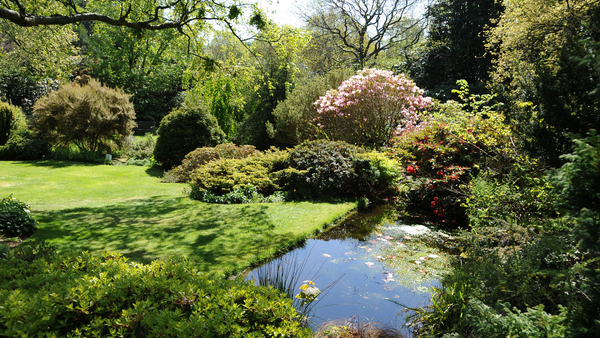
Cruickshank Botanic Garden
The Cruickshank Botanic Garden is situated on our King's College campus. It is used to support both our teaching and research; existing to promote the diversity and importance of plants and their role in the natural world.
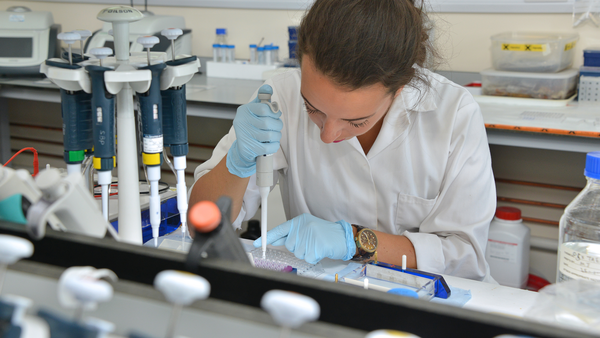
Laboratory Facilities
Our laboratory facilities include advanced analytical equipment to study soil chemical, physical and biological properties. Students have the opportunity to access state-of-the-art facilities such as mass spectroscopy, GC-MS and XRay CT imaging.
Get in Touch
Contact Details
- Address
-
Student Recruitment & Admissions
University of Aberdeen
University Office
Regent Walk
Aberdeen
AB24 3FX

